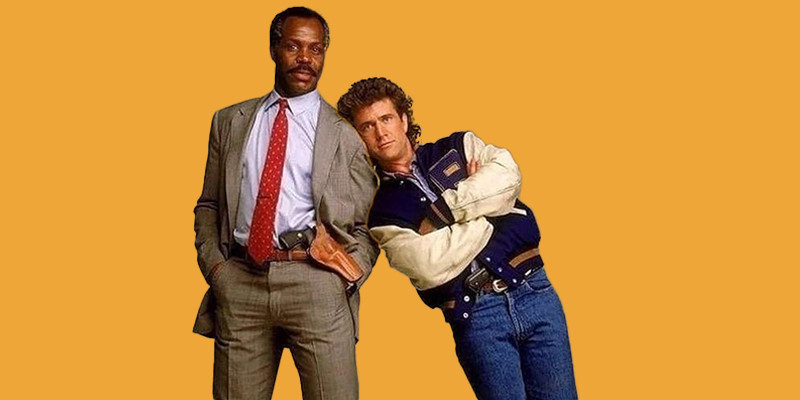Lethal Weapon is fine! It’s good! But it could be so much more.
There’s a lot going on in the movie and some of it’s too much and some of it’s not enough. But its nucleus is pretty perfect; at its core, Lethal Weapon is an undeniable Yin-Yang buddy-cop story featuring two leads with extraordinary, unignorable chemistry. Danny Glover’s straitlaced Roger Murtaugh and Mel Gibson’s insane Martin Riggs fit together perfectly, and when they are sparring and complaining and helping each other out even while driving each other crazy, Lethal Weapon feels perfect. There are other times when it doesn’t. But those aren’t important right now.
I might like Lethal Weapon a lot more if it weren’t for Lethal Weapon 2, a film which not only (in my opinion) fulfills the potential of the first film better than the first film, but also concretely builds on the elements established in its predecessor. Lethal Weapon 2 is both a doubling-down on a few chosen dynamics from the first film that worked well, and a knowing expansion of those dynamics into something new, without trying too hard or going too far. Keep in mind that no film has a harder task than that of a sequel, which by its nature is already both pinned down and inflated by expectations before it even starts. Before it’s even made.
The first film, made in 1987, is a revenge-fueled crime movie in which two opposite kinds of cops find themselves working together on a big drug case. The circumstances in which they find themselves are ordinary for that kind of crime movie (except that the film takes place at Christmas, which is a fun touch and wisely not repeated by the sequel).
But Lethal Weapon 2, made in 1989, asks its detectives to grow their bond on a case that actually means something: Murtaugh and Riggs stumble on a group of South African diplomats using their unimpeachable credentials to smuggle drug money. Suddenly, our boys are up against villains who stand for something not only sinister, but also very, very real. Joss Ackland plays Arjen Rudd, the Afrikaner consul-general of South Africa, who (along with a team of Aryan goons) embodies the hypocrisy, corruption, and oppression of the Apartheid regime.
Additionally, the fact that the villain stands for and comes from the tyrant class of an Apartheid state asks Riggs and Murtaugh to confront serious things about the world, and how the world views each of them. Murtaugh is Black, Riggs is not. That Riggs becomes even more of a passionate and outspoken critic of Apartheid as the film goes on nods to his realizing that the world views his beloved partner as lesser than he. And the fact that the two of them fight (and eventually defeat) the representatives from this terrible, racist regime reveals the beautiful triumph of genuine support and love over the closest thing there is to genuine evil in the real world.
So, Lethal Weapon 2 feels more significant, feels more aware of and active in a dialogue about real injustices than its more traditional, escapist parent. The most important thing that a sequel must do is meaningfully add to the original from which it came. Lethal Weapon 2 pulls off the delicate balance that most sequels fail to achieve: a thoughtful evolution of the original story, rather than a jarring tacking-on of new plots or an arbitrary ratcheting-up of action. (Notable exceptions to this rule in the action canon include T2: Judgement Day and Aliens.)
But Lethal Weapon 2 doesn’t merely grow in political awareness. It grows in terms of size. The success of the Murtaugh-Riggs partnership in Lethal Weapon is neatly preserved in the sequel, but it is also wisely expanded with the inclusion of a third character: Leo Getz (a perfect, pre-Oscar Joe Pesci), a chatty, excitable star witness in a case that connects to the activities of the dissembling South African diplomat-criminals. Lethal Weapon 2 is full of references to The Three Stooges towards the beginning… and then it turns the Riggs-Murtaugh duo of opposites into a trio of opposites, and puts them through a series of incredible camaraderie-fueled gags.
This permits Riggs and Murtaugh to not merely reproduce their chafing-but-loving relationship from the first; it solidifies them as a partnership that, as a bloc, chafes against the new guy for a bit. On a simple level, the inclusion of a third buddy circumvents the inevitable redundancy of the two of them fighting all the time (and it doesn’t offer the incorrect assumption that adding a third player wouldn’t change the dynamic between the two, thus preventing the film from feeling like a long, behavioral Mexican standoff). But on a complex level, it also is valuable in terms of their overarching character arcs; this element allows their relationship to feel like it’s adapted, deepened in real time since the first one.
Incredibly, in Lethal Weapon 2, Riggs and Murtaugh feel more like real people than you might expect would lead a high-octane action movie. The whole vehicle has heart and soul: in its representation of friendships and family-making, in its desire to say something relevant about injustice in reality, in its willingness [and this is kind of spoiler] to kill off pretty big characters but refusal to let anything happen to Riggs’s dog.
There will be those who will get stuck on how Lethal Weapon 2 (and the franchise in general) has aged, from a shockingly-aggressive flirtation scene to the general fact of Mel Gibson’s real-life objective terribleness. I understand. Real as these factors are, though, I hope they don’t overtake the overall shine of film: its many delights and its truly impressive self-reinvention.
To dwell in the nitty-gritty of this achievement for a moment longer… Lethal Weapon 2 feels like a masterclass in fine-tuning the expectations that naturally encircle sequels or franchise installments. Lethal Weapon 2 is not bigger than its predecessor; it is… older and wiser. It knows what its progenitor has set up, and it knows what to do about that.
Few examples in the movie explain this better than a playful and deliberate Chekhov’s Gun; a nail gun is mentioned early in the film, lies in wait for most of the narrative, and then appears later as an effective weapon. This is a twist on one of the greatest rules about staging expectations in a narrative; an expectation is laid down and then fulfilled, but it’s done as a kind of pun.
Lethal Weapon 2 knows how to leverage itself against the pitfalls of growing a plot in general, and then growing it past its original framework. And what it produces is a delightful, calculated, and satisfying action movie. Personally, I’ll never get too old for this shit.

















